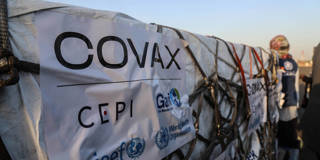As the COVID-19 pandemic enters its third year, millions of people around the world remain in the grip of fear and uncertainty, owing to our collective failure to achieve universal vaccination. Still, three upcoming events offer world leaders a chance to begin to remove this moral stain.
SEOUL – With 124 million new COVID-19 cases worldwide since the start of 2022, and with the COVID-19 virus spreading, mutating, and stalking even the fully vaccinated, the world faces a grim truth: everyone will live in fear until no one lives in fear. That is why world leaders must resolve that 2022 will be the year when we finally bring the pandemic under control.
Three upcoming meetings present immediate opportunities to agree on the essential funding necessary to stop the pandemic and avert future ones: the G20 finance ministers’ summit this month, the United Nations High-Level meeting on universal vaccination immediately thereafter, and the reconvening of US President Joe Biden’s global vaccine summit in March. World leaders will not be starting from scratch. The international COVAX facility has delivered more than 1.1 billion vaccine doses, primarily to the poorest countries, and the Access to COVID-19 Tools Accelerator (ACT-A) has provided more diagnostics, therapeutics, and treatments.
Still, more than 12 months after the first vaccinations, and with enough vaccine doses (more than 12 billion) now manufactured to immunize the entire world, only one in a hundred (and one in two hundred tests) have gone to low-income countries. Low-income countries’ pitifully low share of fully vaccinated people – just 5% (and 11% in Africa) contrasts starkly with the 72% rate in high-income countries. This gap suggests that we value human life in the Global South far less than in the richer North. This is not just a medical or logistical failure; it is a moral one.

SEOUL – With 124 million new COVID-19 cases worldwide since the start of 2022, and with the COVID-19 virus spreading, mutating, and stalking even the fully vaccinated, the world faces a grim truth: everyone will live in fear until no one lives in fear. That is why world leaders must resolve that 2022 will be the year when we finally bring the pandemic under control.
Three upcoming meetings present immediate opportunities to agree on the essential funding necessary to stop the pandemic and avert future ones: the G20 finance ministers’ summit this month, the United Nations High-Level meeting on universal vaccination immediately thereafter, and the reconvening of US President Joe Biden’s global vaccine summit in March. World leaders will not be starting from scratch. The international COVAX facility has delivered more than 1.1 billion vaccine doses, primarily to the poorest countries, and the Access to COVID-19 Tools Accelerator (ACT-A) has provided more diagnostics, therapeutics, and treatments.
Still, more than 12 months after the first vaccinations, and with enough vaccine doses (more than 12 billion) now manufactured to immunize the entire world, only one in a hundred (and one in two hundred tests) have gone to low-income countries. Low-income countries’ pitifully low share of fully vaccinated people – just 5% (and 11% in Africa) contrasts starkly with the 72% rate in high-income countries. This gap suggests that we value human life in the Global South far less than in the richer North. This is not just a medical or logistical failure; it is a moral one.